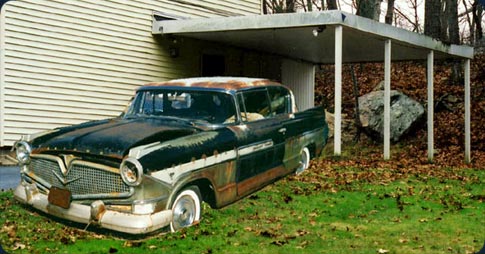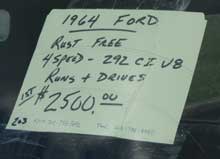From time to time, the guys over at the Hemmings Blog, one of the more inspired forms of journalism to emanate from the Green Mountain State, look at cars available for under $5,000. That seems to be about the minimum for a car that runs in which you’d dare to be seen. For people of my generation, though, that seems like a lot of money, for we can remember when $500 would buy a pretty decent car.
While at Hershey the week before last, I decided to keep my eyes open to see what sort of car I could buy for $3,000, a sum of money I could easily lay my hands upon and, not coincidentally, the price I paid for Angus the Hudson in December 1976. I was surprised at the results.
We all know about stratospheric “Hershey prices,” so I did not take the $3,000 limit too seriously – there’s always room for negotitation, particularly on Saturday afternoon – but some of the asking figures were, frankly, insane. Granted, barn-fresh prewar cars can be expensive, like the Lincoln service car at $21,500 and the ’39 Ford convertible sedan for $14,999, but why pay tens of kilobucks for a restoration project when you could probably drive home in a nice Model T roadster for $6,500. A little less money would buy a 1940 Bantam coupe, that might also run. The 1941 Ford one-taillight-one-wiper Special coupe was certainly rare, but does that make it more valuable than a Super Deluxe model in comparable condition? Grandpa’s 1937 DeSoto at $27,000, though, makes it look like good value indeed. Neither the 1930 Whippet nor the brokeback ’37 Ford had a price listed, nor did the 1927 Buick, but at least the latter left room for haggling. The $600 Model A Ford and Overland we’ll dismiss, as they’re not whole cars.
Postwar cars were similarly diverse. Thirteen-five for a ‘57 Olds with broken windows seems high, but the value guides do show a premium for the hardtop wagon. Seven grand for a sun-dried Cali-Camino is indeed rich, but perhaps they’ll get it. Ten-and-a-half big ones is too much for any standard VW, in my opinion, but the value guides disagree. Unfortunately, the Beetle that fit my budget was a bit tatty. I wouldn’t pay $4,500 for a Mercury that you couldn’t leave out in the rain, though $4,300 for a ‘62 Ford Galaxie might be palatable, if I actually thought the car was attractive. A ‘48 Dodge seemed a relative bargain at $1,500, but it was not a running car. The only hope for an impecunious drive-away seemed to be a $2,500 ‘64 Ford F100, though it showed that “rust free” is a relative term. Then I saw the ‘61 Studebaker Lark being offered in the car corral. “I think it’s worth $3,800” said the seller, and it came with the original owner’s manual. If I were serious about buying a car, I’d have seen how close to my $3,000 limit he would come.

